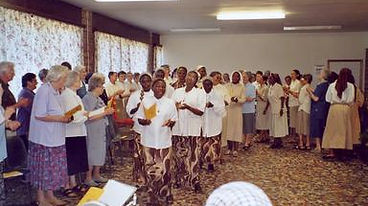
Sisters of Sainte-Marie de Namur

A bit of history
A congregation born of the contradictions of history...
Our timeline
1974 - 1819
REVOLUTION
FRENCH
In1794, Belgian provinces are again under the yoke French. SO
went wild religious persecution with the closure of churches,
the suppression of monasteries and abbeys. Boneffe Abbey was sold andthe monks forced to flee, dispersed.

DOM JÉRÔME MINSART
Dom Jérôme Minsart, originally from Linsmeau, was the youngest in the community.
He took part in the clandestine meetings of the monks of Boneffe, in the cave of Mercy,
in Folx les Caves until the time of total dispersal.

In1806, he came to Namur where he was appointed vicar, then parish priest at the parish of Saint John the Evangelist.
In1813, he was appointed parish priest the most important of the city, parishSaint Wolf.
He marked the history of Namur by his contribution to the restoration of churches and chapels
like the chapel ofOur Lady of the Ramparts..
He devoted all his care to the restoration of his parish church, a masterpiece of Baroque art built by
the Jesuits at17th century.
Even today, you can admire the tabernacle that he placed on the high altar.
Like Nicolas Minsart was concerned about Christian education, he brought his help to teaching religious communities:
- the Brothers of the Christian Schools
- the Ursulines
- the Sisters of Notre Dame
- the Jesuit college reorganized in 1831.
Sorry to see the little girls in her ward left to fend for themselves, without any training,
Dom Minsart appealed to two young Christian women to open a sewing workshop for these children who would thus an honest earner.
It wasJosephine Sana AndElizabeth Berger
He bought and had them prepare a small house in the rue Piconnette (Fumal Street)
On November 11, 1819, they settled there.
The sewing workshop was opened and young people began to frequent it. Dom Minsart himself gave them Christian instruction.
At the end of the first year, he welcomed other people who wanted to share the kind of life of the 1st associates: common life, prayer, of poverty in simplicity at the service of young girls in the workshop.
After several years, parents insisted that a school be opened where their children could combine manual work with the study of letters...
The number of students will always increase and until today the need will be felt of buildings..
With the end of the Dutch regime, Catholic schools flourished again
This is how Father Minsart sent 4 Sisters of Saint Loup to Châtelet, in order to reopen the school that the Dominicans had had to abandon.
With independence, Belgium regained its freedoms and endowed itself with a constitution which would protect them.
So, Dom Minsart asked that his small establishment be recognized as community nun.
In 1834, The Bishop of Namur gave his approval to the new congregation.
The young women, hitherto 'associated', received the religious habit and made the vows of chastity, poverty and obedience.
Among them was Rosalie Nizet, Sister Claire of Jesus.
On the death of Dom Minsart (1837) he returned to Mother Clare of Jesus, superior of the community, to continue the task of the founder.
She undertook the construction of the chapel of the mother house. She responded to solicitations and sent sisters to Rochefort, Fosses, Huy, Seraing, Montignies...
Her missionary zeal went beyond borders: she would have liked sisters in India...
It was under her leadership that the first group of sisters left for the United States in 1863.
The foundations continued in Belgium and beyond the oceans:
- 1863: The United States
- 1886: Canada .
- 1896: England
In 1923, in response to the Pope's appeal, took place the first departure for Africa, the Congo..
- 1959: the Rwanda
- 1968: Cameroon
- 1976: Brazil
- 1986: the Dominican Republic
The missionary momentum continues today: in February 2007 the first community in Tanzania, in Dar Es Salaam.


November 11, 1819



1830, The independence of Belgium

MOTHER CLAIRE DE JESUS, CO-FOUNDER
The joy ofbe together



